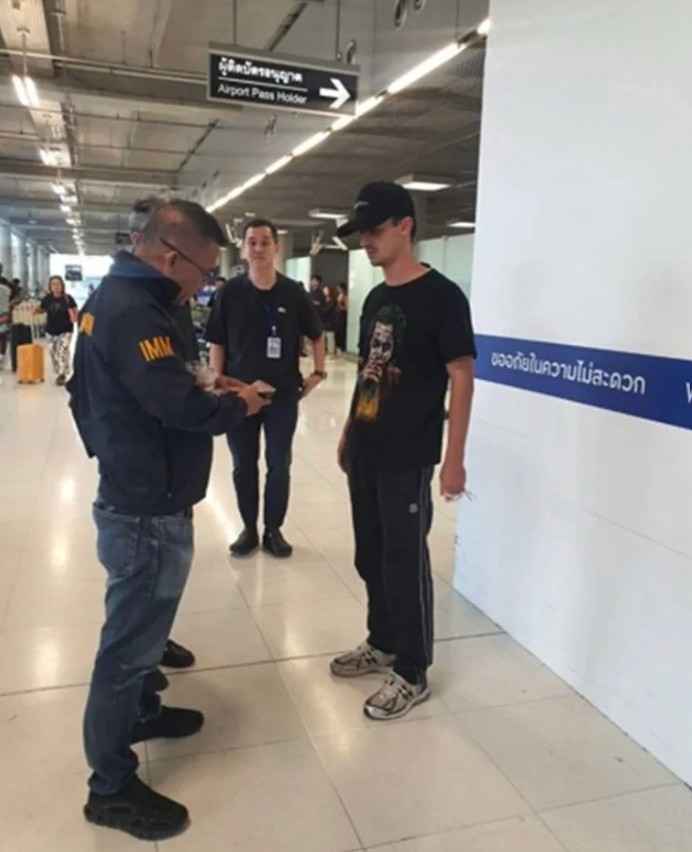Thailand Pickup Truck Original Video and Sparked Outrage
Thailand has long promoted itself as one of Asia’s most beloved tourist destinations. With its pristine beaches, bustling markets, rich cultural traditions, and family-friendly attractions, the country attracts millions of visitors every year. Tourism is not only a key part of Thailand’s economy but also central to its global image as a safe, welcoming, and vibrant nation.

However, every so often, incidents emerge that threaten to tarnish this reputation. One such case erupted in September 2025, when a short yet shocking video from Phuket spread like wildfire across social media. The clip, only 15 seconds in length, depicted a Russian man and a Thai woman a moving pickup truck.
The incident ignited widespread outrage in Thailand, leading to swift police action, intense public debate, and renewed questions about the conduct of foreign tourists. Beyond the immediate scandal, the case raised broader concerns about morality, tourism management, and cultural respect in a country heavily reliant on international visitors.
Contents
The Viral Video Incident
The scandal began on September 26, 2025, when the footage surfaced online. The 15-second clip showed a 23-year-old Russian man, later identified as Georgii, with a 42-year-old Thai woman. The act took place on a moving pickup truck driving along a public road in Phuket, with other vehicles visibly nearby.
The uncensored video of Georgii and the Thai woman is going viral
thailand-pickup-truck-video.mp4
The fact that the incident unfolded in broad daylight and in a public space deeply alarmed many. Authorities later confirmed that children or unsuspecting bystanders could easily have witnessed the act.
Further investigation revealed that the Thai woman had been paid 1,000 baht (about RM130 or roughly USD 27) for her involvement. She admitted to police that Georgii told her the video would be shared with his Russian audience online. Officials also discovered that Georgii had a history of producing online content, which added weight to suspicions that the video may have been created for profit rather than personal use.
Arrest and Legal Action
Thai police wasted no time in responding. On September 25, just one day after the video went viral, officers detained Georgii at Bangkok’s Suvarnabhumi Airport. Reports indicated that he had been attempting to leave the country before the scandal escalated further.

He was initially charged with public indecency, a violation that in Thailand typically carries a fine of up to 5,000 baht (around USD 135). However, authorities noted that if it could be proven that the video was distributed online for financial gain, Georgii could also face prosecution under Thailand’s strict Computer Crime Act.
Such additional charges could carry far more serious penalties, including jail time. Moreover, immigration officials hinted at the possibility of revoking Georgii’s visa and permanently banning him from reentering Thailand.
This swift action underscored the seriousness with which Thai authorities approached the case, especially given the national embarrassment caused by the video.
Thai Police and Government Response
Senior law enforcement figures emphasized the importance of taking strict measures to deter similar incidents. Phuket tourist police chief Lieutenant-Colonel Ekachai Siri confirmed Georgii’s charges and assured the public that authorities were treating the matter with utmost seriousness.
Meanwhile, Colonel Chatree Chukaew, head of Muang Phuket Police Station, went further in his remarks. He publicly called for Georgii’s visa to be canceled and for him to be blacklisted from reentering Thailand in the future.
“This type of obscene act in public not only violates our laws but disrespects our country,” Colonel Chatree declared. “Foreign visitors who behave in such a manner must face consequences to protect our reputation and the safety of our society.”
The government’s stance reflected a growing frustration among Thai officials. While Thailand continues to depend heavily on tourism for economic growth, incidents of misconduct by foreign visitors have repeatedly embarrassed the nation and fueled concerns about cultural disrespect.
Social Media and Public Backlash
Perhaps the strongest response came from ordinary citizens. Outrage quickly spread across Facebook, X (formerly Twitter), and other social media platforms.
Many demanded harsh punishment. One user wrote: “Catch them and deport them immediately. They should be blacklisted forever.” Another added: “The only thing I’m concerned about is young witnesses on the road. Punish them harshly, not just with a fine.”
A recurring theme in the online backlash was dissatisfaction with the relatively minor penalties for public indecency. Netizens widely argued that a 5,000 baht fine was far too lenient for conduct that could damage Thailand’s international reputation.
The comments reflected not only anger at the indecency itself but also a broader sense of cultural violation. Many felt that such acts represented blatant disrespect for Thai laws and traditions, particularly in a country where public morality is taken very seriously.
Pattern of Similar Incidents
While the Phuket case was shocking, it was not the first time that Thailand had faced such a scandal. In 2024, two foreign visitors were filmed engaging a beach in Pattaya, one of the country’s most famous family-friendly coastal destinations.
That earlier case also prompted widespread condemnation, particularly because Pattaya is often promoted as a safe environment for families. Much like the Phuket scandal, the incident sparked calls for harsher legal action and greater policing of tourist areas.
Both incidents illustrate a recurring pattern: the clash between some tourists’ behavior and Thailand’s conservative cultural values. While Thailand’s nightlife and reputation for adult entertainment attract millions of visitors, this same notoriety contributes to repeated scandals involving foreigners who overstep social boundaries.
Cultural and Tourism Implications
Thailand’s tourism industry is an economic lifeline, contributing significantly to GDP and providing millions of jobs. For this reason, safeguarding the country’s reputation as a welcoming but respectable destination is vital.
Scandals such as the Phuket pickup truck video threaten this delicate balance. Local residents have voiced concerns that repeated misconduct could paint Thailand as a permissive or unsafe country for families, discouraging certain types of visitors.
One social media user captured this sentiment bluntly: “If Thai officials ignore this case, the country will be embarrassed. Don’t let them insult us.”
The incident has sparked broader questions: Should Thailand impose stricter penalties for public indecency? Should foreign offenders automatically face deportation and blacklisting? And how can officials balance the need to promote tourism with the equally important task of upholding cultural norms and social order?
For many Thais, the answer lies in stricter enforcement. Calls have intensified for more police patrols in tourist-heavy areas, stronger coordination between local law enforcement and immigration, and harsher penalties for offenders who disrespect Thai values.
The arrest of Georgii, the 23-year-old Russian man behind the Phuket pickup truck scandal, highlights the growing challenges Thailand faces in balancing its booming tourism industry with the protection of cultural and legal standards.
Although the video lasted only 15 seconds, its impact was far-reaching. It provoked outrage across Thai society, ignited debates over morality and tourism policy, and placed heavy pressure on authorities to act decisively.
By charging Georgii with public indecency and investigating potential violations under the Computer Crime Act, Thai officials signaled their determination to deter similar acts in the future. Meanwhile, public sentiment overwhelmingly favors harsher punishments, deportation, and permanent blacklisting of offenders.
This case serves as a reminder that in the digital age, a single act of misconduct can reverberate far beyond its immediate setting. For Thailand, the viral video underscores the urgent need to enforce laws not only to protect public decency but also to defend its status as a respected global tourist destination.
The outcome of Georgii’s case will likely serve as a benchmark for how Thailand handles similar incidents in the future defining the line between personal freedom and public responsibility for millions of visitors who come to experience the beauty of the country.
Daily News -Hey Kayla How You Doing Original Video and Hi Kayla No Blur
Ryan Easley Tiger Video and Tragedy at Growler Pines
Younglo Instagram Story Video Sparks Uproar and Controversy
Edwin Cruz Gomez Video and the Death of Jhoanny Gomez-Alvarez
Tyler Robinson Video in the Fatal Shooting of Charlie Kirk
Yordanis Cobos-Martinez Video Kill Chandra Nagamallaiah in Dallas Motel Beheading
Charlie Kirk Shooting Full Video on X/Twitter and Close Up

